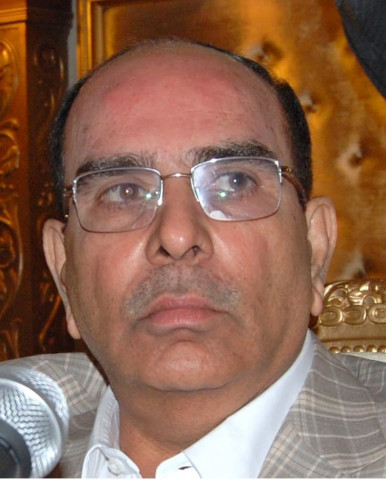Riaz admitted to trying to buy justice: SC
Property magnate says despite payments of Rs342.5 million he didn’t get any relief from the court.

With Malik Riaz’s first appearance in court on the matter, the property tycoon’s legal team finally broke its silence on the alleged payments made to the chief justice’s son – providing not only a concise statement, but 80-odd pages of “evidence” and receipts of some Rs342.5 million in payments.
The evidence against Dr Arsalan Iftikhar prompted Justice Arif Hussain Khilji to comment that Riaz had, by his own admission, actually attempted to purchase justice through payments and perks to the chief justice’s son via his (Riaz’s) son-in-law.
Tuesday’s hearing was conducted in front of a packed courtroom, where the court was told, repeatedly, by Riaz’s counsel that, despite the payments, his client had not gotten any “relief” from the court. Yet, in a somewhat ironic stand, Riaz’s statement complained of Dr Aralan’s “crimes and misdeeds” and that by accepting the payments, the chief justice’s son had “cheated and defrauded” the property tycoon and his family.
Riaz’s statement also contended that Dr Arsalan had told a mutual friend that he could “manage to resolve the said cases in favour of Bahria Town from the court, and on the said pretext, repeatedly got favours in different shapes.”
Riaz also termed the suo motu action taken by the chief justice illegal, and asserted that neither President Zardari nor Prime Minister Gilani, nor any political party or agency prompted him or helped him in this case. Interestingly, the statement filed by Riaz had left out the word “not”, thereby implying that he had indeed been helped. Riaz’s counsel later pointed out that the typo and asked for the record to be corrected.
Justice Jawwad pointed out several discrepancies in Riaz’s statement. During proceedings, Malik Riaz approached the rostum and said he wanted to make a short statement, but he was not allowed to address the court directly by Justice Jawwad S Khawaja, who pointed that Dr Arsalan had also been disallowed from such a move.
Giving details, Riaz said that the money had been “extorted” through his son-in-law Salman Ahmed. In all, the details of payments and perks mentioned three foreign trips in 2010 and 2011 costing Rs8,860,579, Rs692,949 and Rs5,947,726. Two of these trips to London included the chief justice’s family. Cash payments were also allegedly made to the tune of Rs327 million in different installments over a period of time – bringing the total of expenses and payments to over Rs342 million.
On the court’s query, it was told that Ahmed was a British-based businessman. Documents linked Ahmed and Dr Arsalan through mutual friend Ahmed Khalil, who is also a project partner of Riaz.
Riaz’s lawyer, Zahid Bokhari, also raised an objection over the constitution of the current bench, and the investigative powers of the judiciary, and suggested that the case be shifted to an investigation agency such as the Federal Investigation Agency (FIA), National Accountability Bureau (NAB), police or even the anti-corruption establishment.
Dr Arsalan’s lawyer, Malik Ishaq, expressed lack of confidence in FIA, NAB and other investigation agencies and supported the suggestion of a judicial commission to probe this matter. The court found Bokhari’s suggestions suitable and said that it would announce its decision on Thursday.
Attorney-General Irfan Qadir also supported a probe by NAB.
Justice Khilji told Riaz’s lawyer that whenever there would be a question over the judiciary’s integrity, the court will take action. However, Riaz in his statement said that he has no issue with the judiciary or the chief justice and he had great respect for all of them.
Media code of ethics
As the proceedings began, the two-member bench also called up two journalist body representatives to the rostrum to question them about media ethics – ostensibly given the sensitivity of the case and the inordinate involvement of the media in the case to begin with. It was pointed out that, other than the defamation laws, there was no statute as such that provided any sort of ethics for the media. In addition, the court was told, there were only the rules set by the Pakistan Electronic Media Regulatory Authority.
Published In The Express Tribune, June 13th, 2012.



















COMMENTS
Comments are moderated and generally will be posted if they are on-topic and not abusive.
For more information, please see our Comments FAQ